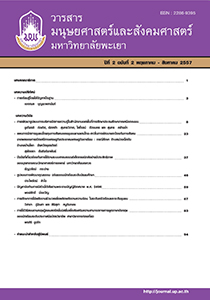รูปแบบการพัฒนาคุณธรรม จริยธรรมนักเรียนระดับมัธยมศึกษา
Keywords:
รูปแบบ, คุณธรรม, จริยธรรม, มัธยมศึกษา, Model, Moral, Ethical, Secondary EducationAbstract
การวิจัยครั้งนี้มีวัตถุประสงค์หลักเพื่อพัฒนารูปแบบการพัฒนาคุณธรรม จริยธรรมนักเรียนระดับมัธยมศึกษาและมีวัตถุประสงค์เฉพาะ ดังนี้ 1) เพื่อศึกษาข้อมูลพื้นฐานและแนวทางในการพัฒนาคุณธรรม จริยธรรมนักเรียนระดับมัธยมศึกษา 2) เพื่อสร้างรูปแบบการพัฒนาคุณธรรม จริยธรรมนักเรียนระดับมัธยมศึกษา 3) เพื่อทดลองใช้รูปแบบการพัฒนาคุณธรรม จริยธรรมนักเรียนระดับมัธยมศึกษา 4) เพื่อประเมินรูปแบบการพัฒนาคุณธรรม จริยธรรมนักเรียนระดับมัธยมศึกษา
กลุ่มตัวอย่างในการวิจัยเพื่อทดลองใช้รูปแบบการพัฒนาคุณธรรม จริยธรรมนักเรียนระดับมัธยมศึกษาในครั้งนี้ ได้แก่ นักเรียนระดับชั้นมัธยมศึกษาปีที่ 4 จำนวน 37 คน โรงเรียนนาน้อย อำเภอนาน้อย จังหวัดน่าน เครื่องมือที่ใช้ในการเก็บรวบรวมข้อมูล ได้แก่ แบบทดสอบวัดเหตุผลเชิงจริยธรรมก่อนและหลังการพัฒนา แบบสังเกตพฤติกรรมการมีคุณธรรม จริยธรรมนักเรียนระดับมัธยมศึกษาของครูที่ปรึกษาและผู้ปกครองนักเรียน และแบบประเมินความพึงพอใจของนักเรียนที่มีต่อรูปแบบการพัฒนาคุณธรรม จริยธรรมนักเรียนระดับมัธยมศึกษา สถิติที่ใช้ในการวิเคราะห์ข้อมูล ได้แก่ ค่าเฉลี่ย และส่วนเบี่ยงเบนมาตรฐาน และเปรียบเทียบเหตุผลเชิงจริยธรรมของนักเรียนระดับมัธยมศึกษาโดยใช้สูตร t-test Dependent
สรุปผลการวิจัยสรุปได้ ดังนี้
การศึกษาความต้องการจำเป็นและการจัดลำดับความสำคัญของความต้องการจำเป็นในการพัฒนาคุณธรรม จริยธรรมนักเรียนระดับมัธยมศึกษา พบว่ามีความต้องการเรียงลำดับดังนี้ ด้านเทคนิควิธีการจัดกิจกรรมการพัฒนา ด้านสื่อ วัสดุ อุปกรณ์และแหล่งเรียนรู้ที่ใช้ในการจัดกิจกรรมการพัฒนาและด้านการวัดผลประเมินผลความมีวินัย ความซื่อสัตย์และความมีจิตสาธารณะ มีความจำเป็นในการพัฒนาคุณธรรม จริยธรรมนักเรียนระดับมัธยมศึกษา
รูปแบบการพัฒนาคุณธรรม จริยธรรมนักเรียนระดับมัธยมศึกษา ประกอบด้วย 1) สภาพปัญหาและความจำเป็น 2) หลักการและเหตุผลของรูปแบบ 3) แนวคิดพื้นฐาน 4) วัตถุประสงค์ 5) โครงสร้างของรูปแบบ 6) กิจกรรมการพัฒนา 7) สื่อและแหล่งเรียนรู้ 8) การวัดและประเมินผล
นักเรียนมีพฤติกรรมการมีคุณธรรม จริยธรรมด้านความมีวินัย ความซื่อสัตย์และความมีจิตสาธารณะและมีเหตุผลเชิงจริยธรรมหลังการทดลองใช้รูปแบบสูงกว่าก่อนการทดลองใช้รูปแบบอย่างมีนัยสำคัญทางสถิติที่ระดับ .05 นักเรียนมีความพึงพอใจต่อรูปแบบการพัฒนาคุณธรรม จริยธรรมนักเรียนระดับมัธยมศึกษาอยู่ในระดับมาก
The Model of Moral and Ethical Secondary Students Development
Prapairat Lumjai
Education Administration, University of Phayao
The main objective of this research is to develop a model of moral development and ethics for secondary students. The specific purpose of this study were 1) to study the basic data and the development of moral ethical process for secondary students, 2) to create a model of moral and ethics for secondary students, 3) to test the model developed moral ethical with secondary students, and 4) to assess the moral development model and ethical for secondary students.
The sample used in this study to test the model developed moral ethical is secondary 4, 37 students of Nanoi school, Nanoi district, Nan province. The tools used for data collection are the test of moral reasoning before and after development, assessment behavior observation form the moral and ethical for secondary students of consultant teacher and the parents of sample class students, Assessment satisfaction of secondary students for the modal of moral and ethical, the statistics used in data analysis, including average and standard deviation. And the ethics logical comparison of secondary students by using the t-test dependent.
The results are summarized below:
Educational needs and the priorities of needs in the development of moral and ethical of secondary student found that teachers have commented that technical activities to develop media materials, the places of learning activities used in the evaluation, discipline, loyalty and the public mind are necessary to develop moral and ethical of secondary students.
The model of moral and ethical secondary students development include : 1) The problem and the need 2) Rationale of the model 3) Basic concept 4) Objective 5) Structure of the model 6) Development activities 7) Media and learning 8)Measurement and evaluate.
Students have moral and ethical behavior are discipline, loyalty, the public mind and moral reasoning after used higher than before used with statistically significant at .05. Overall students have satisfaction in the model of moral and ethical secondary students development high level.
Downloads
How to Cite
Issue
Section
License
ผู้นิพนธ์ต้องรับผิดชอบข้อความในบทนิพนธ์ของตน มหาวิทยาลัยพะเยาไม่จำเป็นต้องเห็นด้วยกับบทความที่ตีพิมพ์เสมอไป ผู้สนใจสามารถคัดลอก และนำไปใช้ได้ แต่จะต้องขออนุมัติเจ้าของ และได้รับการอนุมัติเป็นลายลักษณ์อักษรก่อน พร้อมกับมีการอ้างอิงและกล่าวคำขอบคุณให้ถูกต้องด้วย
The authors are themselves responsible for their contents. Signed articles may not always reflect the opinion of University of Phayao. The articles can be reproduced and reprinted, provided that permission is given by the authors and acknowledgement must be given.








